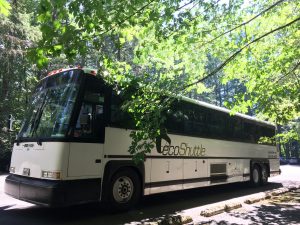By Kate Gaertner and Amy Hall
For the Hollywood Star News
One of the largest areas under our direct control is how we get from our house to where we want to go. Travel utilizing a combustion engine automobile or necessitating an air-flight to get us to our final destination contributes mightily to our personal carbon footprints. All of the choices we make around how we travel and by what mode are critically important to consider given that 30% of our individual carbon emissions come from combusting fossil fuels. As we begin to plan and take adventures both near and far during this second pandemic summer and beyond, let’s consciously consider our approach to taking vacations, holidays, and get-aways that are sustainably-minded and lighter touch while still packing an adventuresome, fun and relaxing punch, when and how we need it.

Three Sustainability Travel Tips
1. Take a trip to Oregon’s Wine Country. Why not combine two things that Oregon is known for: natural environments and excellent wines. The husband-and-wife operated EcoShuttle Charters and Tours company brings individuals and groups to Oregon’s famous Willamette Valley AVA to take-in the rolling hills and verdant landscape, and to sip wine, worry-free, from more than 650 wineries all within 30 mile of downtown Portland. EcoShuttle is committed to green operations, employing buses and vans that run on the highest blend of biodiesel available throughout the seasons: B99/100 during the hot summer months, and either straight vegetable oil or plant-based renewable diesel (R99) from the fall to spring. Call EcoShuttle today to book your very own wine tour this summer and enjoy sipping wine and amazing views surrounded by clean, unpolluted air.
2. Commit to a Pacific NW eco-adventure. One of the many reasons Oregonians stay in their state for generations is because of all the natural richness and historical significance the Pacific Northwest has to offer: from skiing, rock climbing, surfing, paddle boarding, and whale watching to appreciating ancient volcanic flows, volcanic mountains, unique high-deserts, and Native American lands and peoples. Even more compelling is the fact that most of these adventures are within 90 miles of Portland downtown. Check out Ecotours of Oregon, a North Portland touring company that offers group, private and custom tours to Mt. Hood and the Columbia Gorge, tours of Mount St. Helens, whale watching on the Oregon coast, and historical tours of the Lewis & Clark trail and Native American tribal lands. If you’re new to Oregon or have been waiting for that closer-to-home grand adventure, this summer is the perfect time to book your Pacific NW holiday that won’t disappoint!
3. Ditch the plane and travel scenically. Flying is a carbon emissions buster for individuals and given the altitude at which planes cruise, a negative double-whammy to the environment. Try limiting the number of flights you take. If you must travel, pick nonstop whenever possible. A better (for the environment) way to travel? By train or bus. Take a weekend city jaunt to destinations such as Seattle, Bellingham, or Eugene. Amtrak offers a relaxing alternative to driving the stressful and crowded 1-5 Interstate. Head up to Seattle and enjoy views along the coast that you won’t see by car. Walk around, watch a movie and arrive at Union Station in the International District well-rested and ready for adventure. Bolt Bus has a pick up near Lloyd Center in NE and can take you to destinations located both North or South of Portland in a comfortable, clean bus that includes wifi.
Rose City Park Climate Communications Expert Amy Hall and Sustainability Consultant Kate Gaertner write this monthly column with ideas that neighbors can implement to live more sustainable lives and combat climate change. Hall is co-founder of THRIVE creative, and also works at TripleWin Advisory, a corporate sustainability consultancy founded by Gaertner. Gaertner has a book coming out this fall on personal sustainability titled, ‘Planting a Seed: Three simple steps to sustainable living.’
